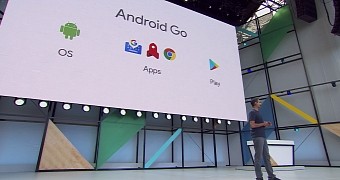During this year's I/O keynote, Google made lots of announcements and even launched Assistant on iOS-running devices. In addition, Google debuted the Android O beta program and introduced Android Go.
Android Go is a new Google initiative that’s aimed at entry-level Android smartphones, allowing them to conduct processes more easily and run various applications faster. The smartphones that Google is targeting with Android Go have 1GB or less of memory and normally run applications at a slower pace. The System UI and kernel will be able to run with just 512MB of memory.
Google states that Android Go will be targeted at users who have limited data connectivity and speak multiple languages, and whose phones don’t support conducting tasks that would require lots of resources.
A version of Android Go will be available with each Android release
Android Go consists of three main areas, Android OS, Google apps and Google Play Store. As such, Android O will be designed to run smoothly on entry-level smartphones, while Google will design its proprietary apps to use less memory, storage space and mobile data. YouTube Go is an example of this, while Google will also make optimizations to Chrome and Gboard.
In addition, Android Go will have a version of the Play store that specifically highlights apps suitable for devices with less RAM capacity. Google says that Android Go will be fully functional “as a single experience” starting in 2018. A variant of Android Go will be released for all future Android versions, starting with Android O.
Android Go seems very similar to another one of Google’s projects from the past, Android One. The Android One initiative was announced about three years ago and they were low-cost devices with less powerful hardware that would receive regular OS updates to the latest Android version. Android One didn’t record the massive success that was expected, and Android Go is Google’s initiative to bring the latest Android version to low-end smartphones in a shorter timeframe.

 14 DAY TRIAL //
14 DAY TRIAL //